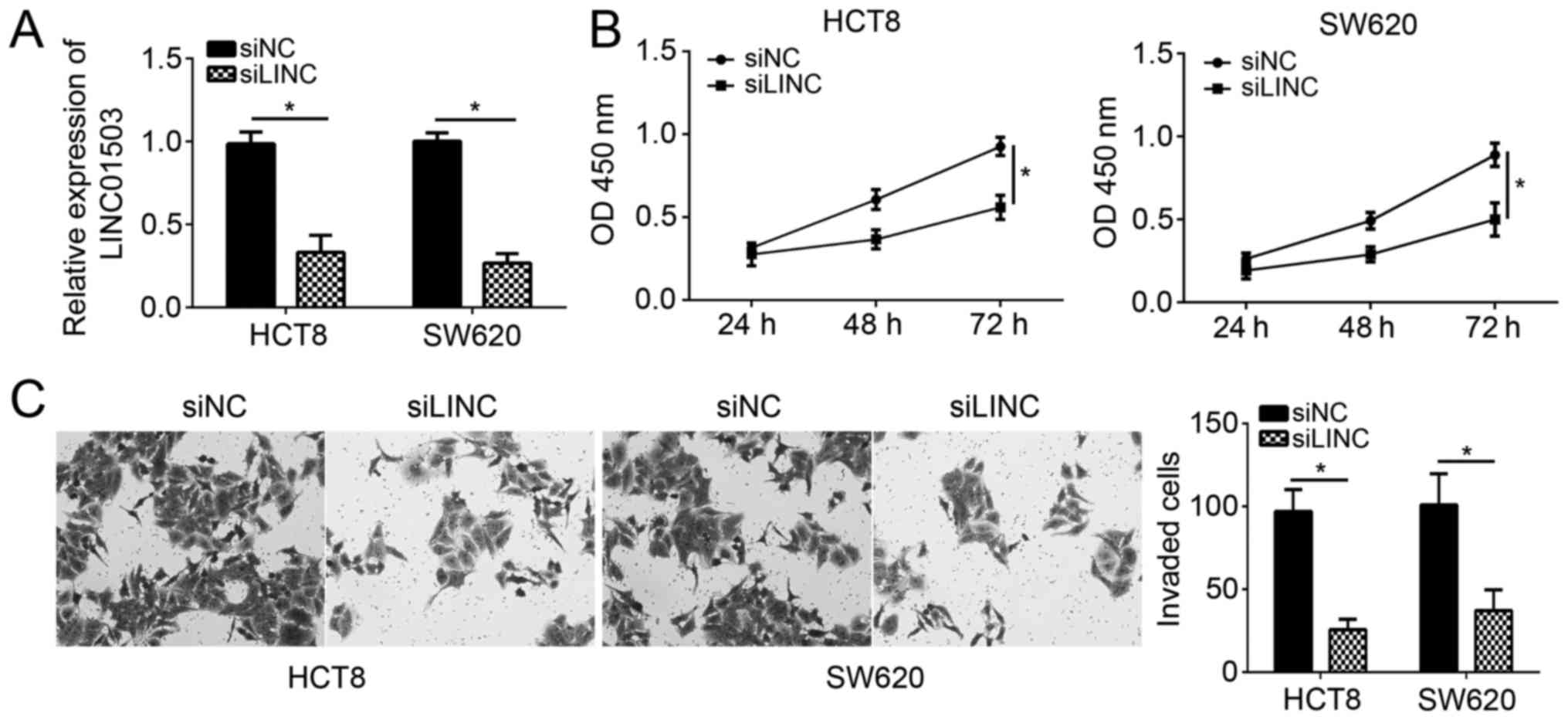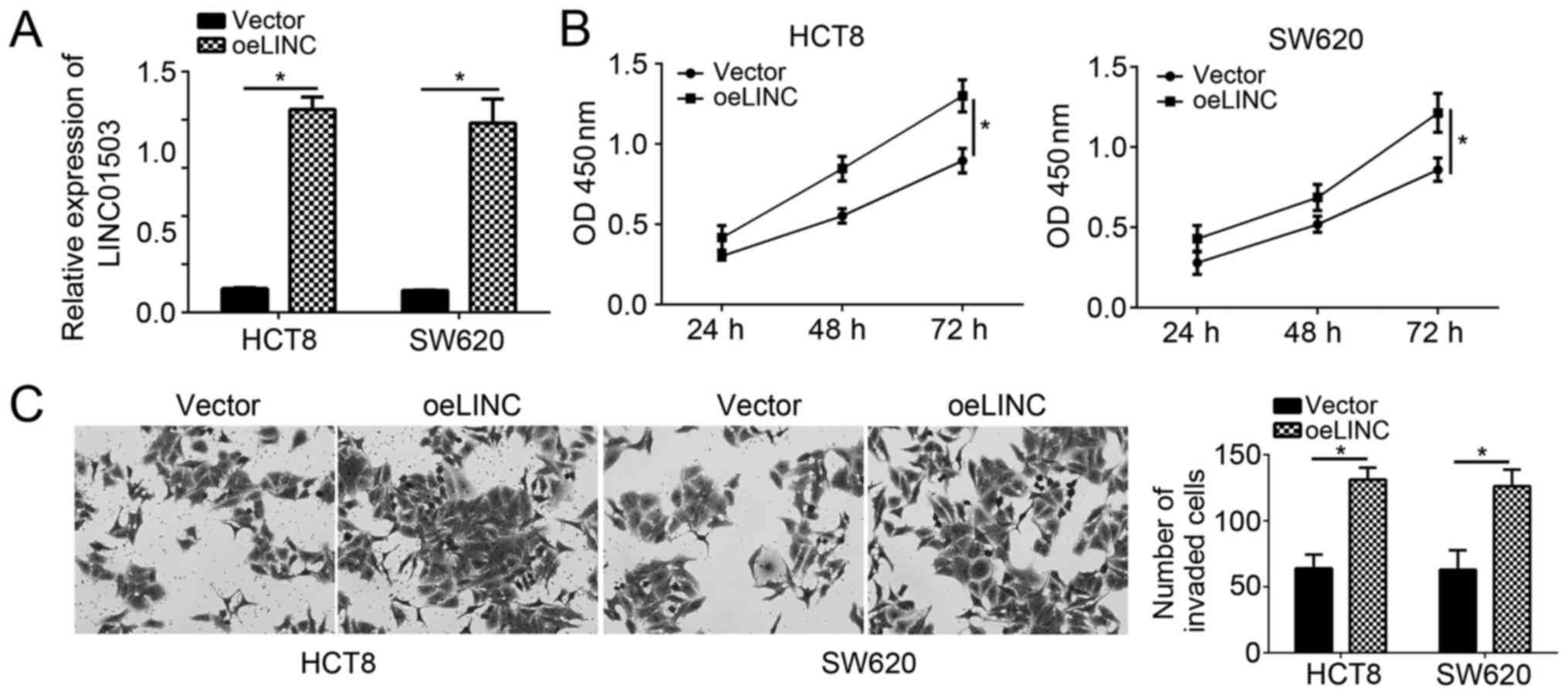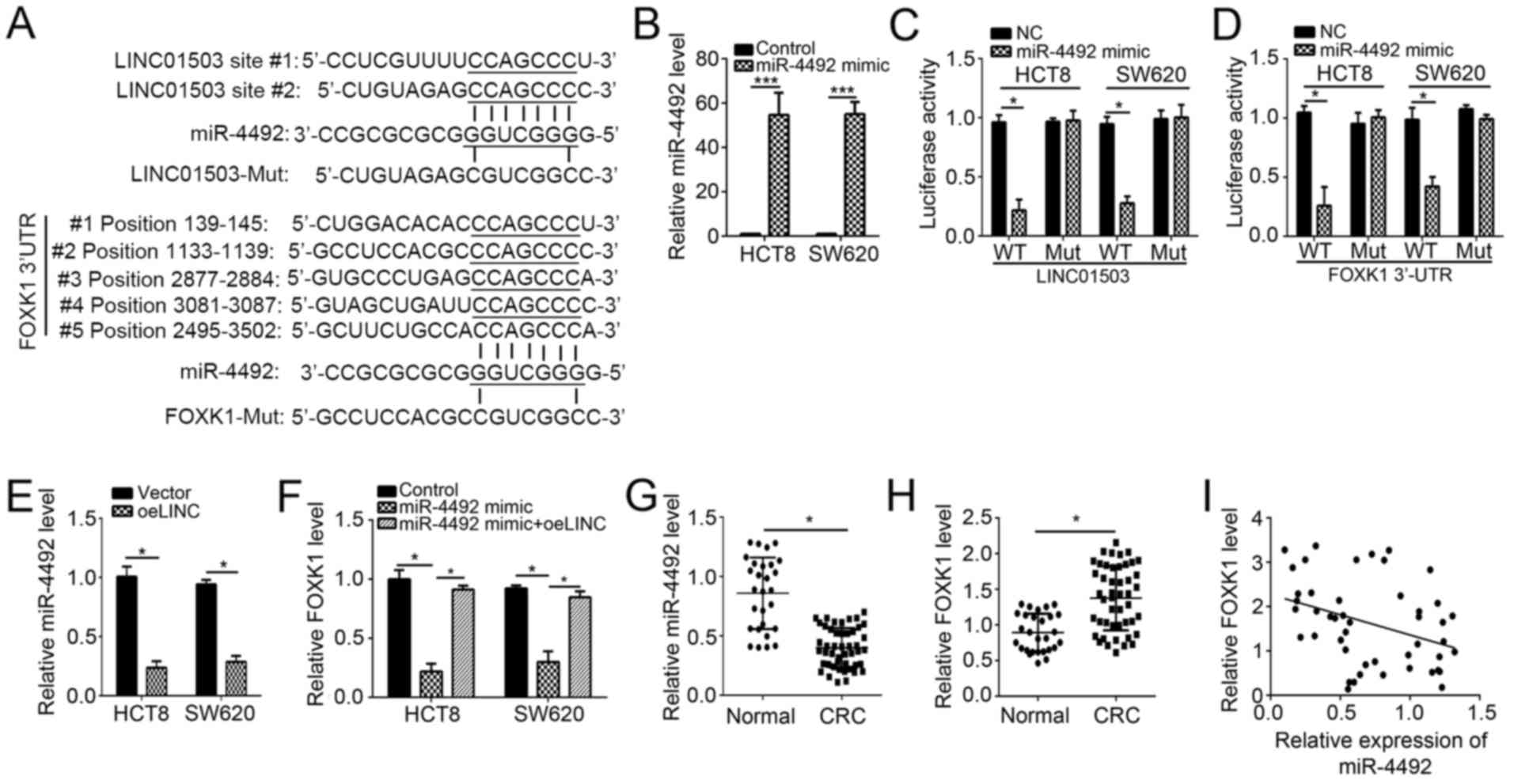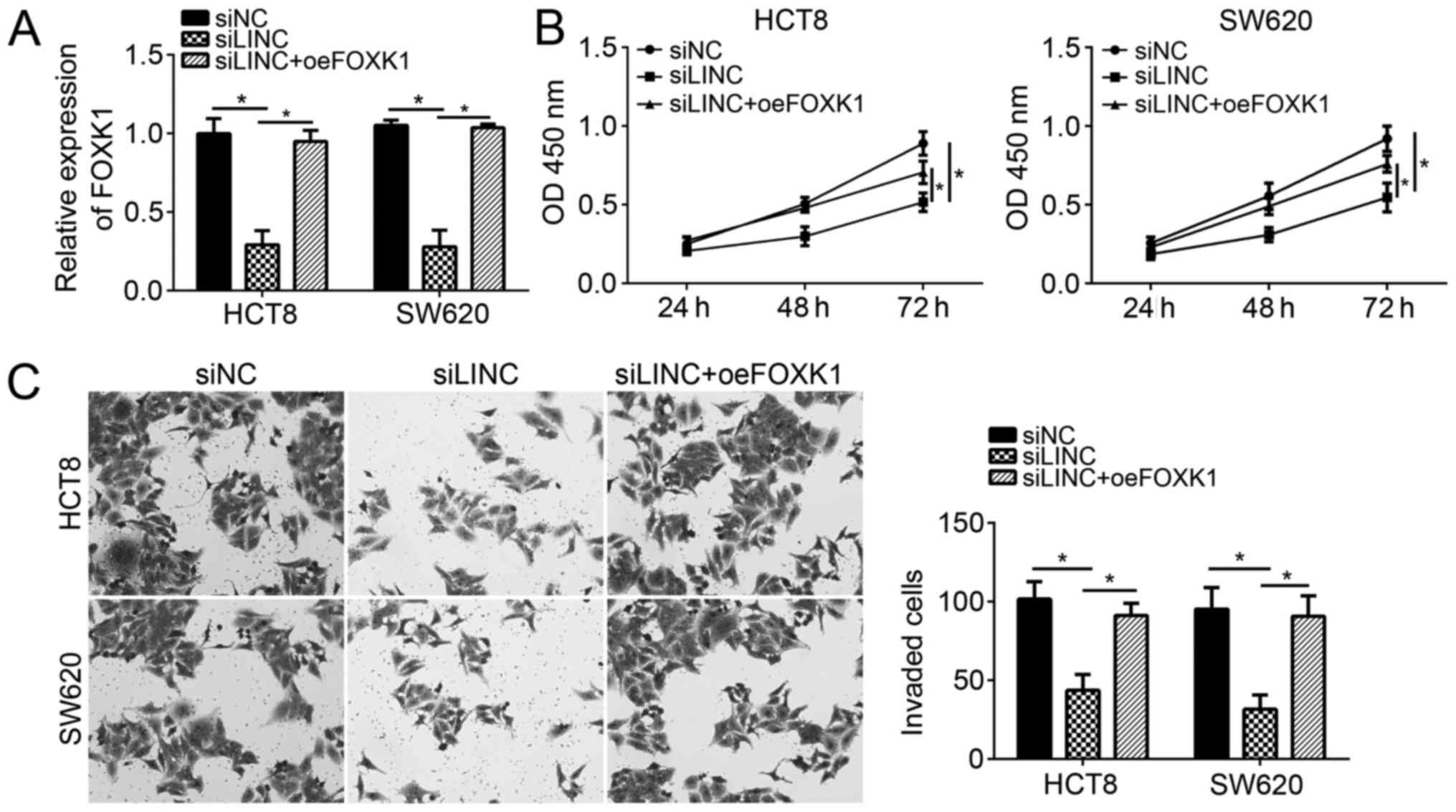|
1
|
Siegel RL, Miller KD and Jemal A: Cancer
statistics, 2015. CA Cancer J Clin. 65:5–29. 2015. View Article : Google Scholar : PubMed/NCBI
|
|
2
|
Almasi Z, Rafiemanesh H and Salehiniya H:
Epidemiology characteristics and trends of incidence and morphology
of stomach cancer in Iran. Asian Pac J Cancer Prev. 16:2757–2761.
2015. View Article : Google Scholar : PubMed/NCBI
|
|
3
|
Krah NM and Murtaugh LC: Differentiation
and inflammation: ‘Best enemies’ in gastrointestinal
carcinogenesis. Trends Cancer. 2:723–735. 2016. View Article : Google Scholar : PubMed/NCBI
|
|
4
|
Mercer TR, Dinger ME and Mattick JS: Long
non-coding RNAs: Insights into functions. Nat Rev Genet.
10:155–159. 2009. View
Article : Google Scholar : PubMed/NCBI
|
|
5
|
Liu B, Ye B, Yang L, Zhu X, Huang G, Zhu
P, Du Y, Wu J, Qin X, Chen R, et al: Long noncoding RNA lncKdm2b is
required for ILC3 maintenance by initiation of Zfp292 expression.
Nat Immunol. 18:499–508. 2017. View
Article : Google Scholar : PubMed/NCBI
|
|
6
|
Ma Y, Ouyang J, Wei J, Maarouf M and Chen
JL: Involvement of host non-coding RNAs in the pathogenesis of the
influenza virus. Int J Mol Sci. 18:E392016. View Article : Google Scholar : PubMed/NCBI
|
|
7
|
Wei AW and Li LF: Long non-coding RNA
SOX21-AS1 sponges miR-145 to promote the tumorigenesis of
colorectal cancer by targeting MYO6. Biomed Pharmacother.
96:953–959. 2017. View Article : Google Scholar : PubMed/NCBI
|
|
8
|
Wang H, Zhang M and Sun G: Long non-coding
RNA NEAT1 regulates the proliferation, migration and invasion of
gastric cancer cells via targeting miR-335-5p/ROCK1 axis.
Pharmazie. 73:150–155. 2018.PubMed/NCBI
|
|
9
|
Fu X, Zhu X, Qin F, Zhang Y, Lin J, Ding
Y, Yang Z, Shang Y, Wang L, Zhang Q and Gao Q: Linc00210 drives
Wnt/β-catenin signaling activation and liver tumor progression
through CTNNBIP1-dependent manner. Mol Cancer. 17:732018.
View Article : Google Scholar : PubMed/NCBI
|
|
10
|
Xie S, Ge Q, Wang X, Sun X and Kang Y:
Long non-coding RNA ZFAS1 sponges miR-484 to promote cell
proliferation and invasion in colorectal cancer. Cell Cycle.
17:154–161. 2018. View Article : Google Scholar : PubMed/NCBI
|
|
11
|
Xie JJ, Jiang YY, Jiang Y, et al:
Increased expression of the long non-coding RNA LINC01503,
regulated by TP63, in squamous cell carcinoma and effects on
oncogenic activities of cancer cell lines. Gastroenterology.
154:2137–2151. 2018. View Article : Google Scholar : PubMed/NCBI
|
|
12
|
Livak KJ and Schmittgen TD: Analysis of
relative gene expression data using real-time quantitative PCR and
the 2(-Delta Delta C(T)) method. Methods. 25:402–408. 2001.
View Article : Google Scholar : PubMed/NCBI
|
|
13
|
Han P, Li JW, Zhang BM, Lv JC, Li YM, Gu
XY, Yu ZW, Jia YH, Bai XF, Li L, et al: The lncRNA CRNDE promotes
colorectal cancer cell proliferation and chemoresistance via
miR-181a-5p-mediated regulation of Wnt/beta-catenin signaling. Mol.
Cancer. 16:92017.
|
|
14
|
Wang L, Wang F, Na L, Yu J, Huang L, Meng
ZQ, Chen Z, Chen H, Ming LL and Hua YQ: LncRNA AB209630 inhibits
gemcitabine resistance cell proliferation by regulating PI3K/AKT
signaling in pancreatic ductal adenocarcinoma. Cancer Biomark.
22:169–174. 2018. View Article : Google Scholar : PubMed/NCBI
|
|
15
|
Fu M, Huang Z, Zang X, Pan L, Liang W,
Chen J, Qian H, Xu W, Jiang P and Zhang X: Long noncoding RNA
LINC00978 promotes cancer growth and acts as a diagnostic biomarker
in gastric cancer. Cell Prolif. 51:Feb;2018. View Article : Google Scholar
|
|
16
|
Chen G, Sun W, Hua X, Zeng W and Yang L:
Long non-coding RNA FOXD2-AS1 aggravates nasopharyngeal carcinoma
carcinogenesis by modulating miR-363-5p/S100A1 pathway. Gene.
645:76–84. 2018. View Article : Google Scholar : PubMed/NCBI
|
|
17
|
Xie CR, Wang F, Zhang S, Wang FQ, Zheng S,
Li Z, Lv J, Qi HQ, Fang QL, Wang XM and Yin ZY: Long noncoding RNA
HCAL facilitates the growth and metastasis of hepatocellular
carcinoma by acting as a ceRNA of LAPTM4B. Mol Ther Nucleic Acids.
9:440–451. 2017. View Article : Google Scholar : PubMed/NCBI
|
|
18
|
Shan Z, An N, Qin J, Yang J, Sun H and
Yang W: Long non-coding RNA Linc00675 suppresses cell proliferation
and metastasis in colorectal cancer via acting on miR-942 and
Wnt/β-catenin signaling. Biomed Pharmacother. 101:769–776. 2018.
View Article : Google Scholar : PubMed/NCBI
|
|
19
|
Chang Z, Cui J and Song Y: Long noncoding
RNA PVT1 promotes EMT via mediating microRNA-186 targeting of
Twist1 in prostate cancer. Gene. 654:36–42. 2018. View Article : Google Scholar : PubMed/NCBI
|
|
20
|
Chen D, Wang K, Li X, Jiang M, Ni L, Xu B,
Chu Y, Wang W, Wang H, Kang H, et al: FOXK1 plays an oncogenic role
in the development of esophageal cancer. Biochem Biophys Res
Commun. 494:88–94. 2017. View Article : Google Scholar : PubMed/NCBI
|
|
21
|
Li L, Gong M, Zhao Y, Zhao X and Li Q:
FOXK1 facilitates cell proliferation through regulating the
expression of p21, and promotes metastasis in ovarian cancer.
Oncotarget. 8:70441–70451. 2017.PubMed/NCBI
|
|
22
|
Zhang P, Tang WM, Zhang H, Li YQ, Peng Y,
Wang J, Liu GN, Huang XT, Zhao JJ, Li G, et al: MiR-646 inhibited
cell proliferation and EMT-induced metastasis by targeting FOXK1 in
gastric cancer. Br J Cancer. 117:525–534. 2017. View Article : Google Scholar : PubMed/NCBI
|
|
23
|
Xie R, Wang J, Liu X, Wu L, Zhang H, Tang
W, Li Y, Xiang L, Peng Y, Huang X, et al: RUFY3 interaction with
FOXK1 promotes invasion and metastasis in colorectal cancer. Sci
Rep. 7:37092017. View Article : Google Scholar : PubMed/NCBI
|
|
24
|
Chen F, Xiong W, Dou K and Ran Q:
Knockdown of FOXK1 suppresses proliferation, migration, and
invasion in prostate cancer cells. Oncol Res. 25:1261–1267. 2017.
View Article : Google Scholar : PubMed/NCBI
|
|
25
|
Wu M, Wang J, Tang W, Zhan X, Li Y, Peng
Y, Huang X, Bai Y, Zhao J, Li A, et al: FOXK1 interaction with FHL2
promotes proliferation, invasion and metastasis in colorectal
cancer. Oncogenesis. 5:e2712016. View Article : Google Scholar : PubMed/NCBI
|



















